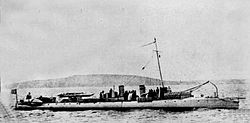Ottoman torpedo boat Sultanhisar
 |
|
| History | |
|---|---|
|
|
|
| Name: | Sultanhisar |
| Namesake: | Sultanhisar |
| Owner: | Ottoman Navy, Turkish Navy |
| Ordered: | 25 October 1906 |
| Builder: | Schneider & Cie in Chalon-sur-Saône, France |
| Laid down: | 1906 |
| Launched: | 1907 |
| Completed: | 1907 |
| Commissioned: | 1907 |
| Recommissioned: | 1924 |
| Decommissioned: | 1928 |
| Struck: | 1935 |
| General characteristics | |
| Type: | Torpedo boat |
| Displacement: | 97 tons (full load) |
| Length: | 40.2 m (132 ft) |
| Beam: | 4.4 m (14 ft) |
| Draft: | 1.9 m (6.2 ft) |
| Propulsion: | Steam, 1 shaft. 2 Du Temple water tube, Schneider & Cie, 11.2t coal 1 triple expansion 3cyl., 2200ihp, Schneider & Cie |
| Speed: | 26 knots (48 km/h) (trial), 16 knots (30 km/h) (1915) |
| Complement: | 3 officers, 17-20 ratings (1907), 32 Ottomans, 4 Germans (1915) |
| Armament: | 2x37mm (1.46 inch) QF H guns, 3xTT 450mm (18 in) SK torpedoes |
Sultanhisar was a torpedo boat of the Ottoman Navy. She was built in 1907 by Schneider & Cie in Chalon-sur-Saône, France, and transferred the same year to Turkey. She is best known for her action during the Gallipoli Campaign of World War I as she sank a Royal Australian Navy submarine in the Sea of Marmara and captured her crew.
As of 16 October 1912, Sulthanisar was assigned to the Bosporus Fleet Command. From 19 December 1912 on, she served at the Armoured Warship Division.
During the naval operations in the Dardanelles Campaign of World War I, the torpedo boat Sultanhisar was tasked with patrolling in the Dardanelles Strait. In addition, she daily transported German general Otto Liman von Sanders, who was the adviser and military commander of the Ottoman Army, between Eceabat and Gallipoli. On 29 April 1915, she received orders to return to Constantinople by sailing along the west coast of the Sea of Marmara. On the way, Commander Ali Rıza Bey changed his route and sailed eastwards in response to reports of the presence of a possible enemy submarine in that area.
The Australian submarine HMAS AE2 was able to pass through the blocked Dardanelles Strait and entered the Sea of Marmara on the early hours of 25 April 1915. She was the first Allied ship to perform the feat.
...
Wikipedia
